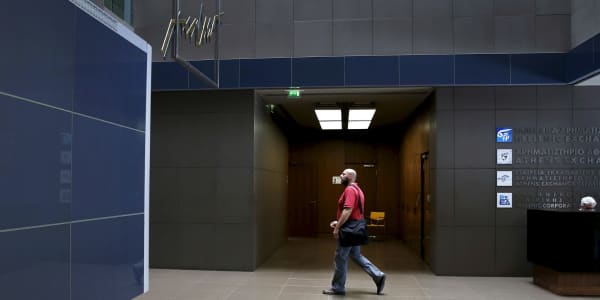A little over four years ago, Cam Wallace and Scott Baigent founded Eight Degrees Brewing, an independent craft brewery based in County Cork, Ireland. "We set up probably in the deepest, darkest time of the recession," Wallace told CNBC.com in a phone interview.
Ireland has faced its fair share of hardship over the last few years: recession, a bailout from the European Union and International Monetary Fund, spending cuts and tax rises. For Wallace, while 2010 was perhaps not the ideal time to start a business, there were still some advantages.
"Interestingly, there's a lot of benefits for setting up in a recession," he added. "In terms of being able to keep the costs low, that certainly is far more easily achieved in a recession because you've got a lot more bargaining power."
Read MoreThis firm survived the euro zone crisis: Here's how
Today, the business – which employs eight people including Wallace and Baigent, produces roughly 500,000 pints of beer annually and exports around the world – is benefiting from another development: the continued weakening of the euro against the dollar after the 1.1 trillion euro ($1.6 trillion) quantitative easing program unveiled by Mario Draghi, President of the European Central Bank, earlier this year.
"Certainly, from an export point of view we're probably a little bit more attractive in pricing, I would imagine," Wallace said.
He went on to explain that the company's horizons are starting to broaden. "We have markets in Singapore and Australia… Hong Kong as well, and the fact that we're getting a lot of those over the line now probably indicates that with the weakening of the Euro we've become a little bit more competitive. It does seem to be opening up new markets for us."
Guillermo Landin is a director and co-founder of Kwamecorp, a British company with a Portuguese subsidiary that specializes in outsourcing designers and software and hardware engineers – or 'lending talent' – to major companies. The business has offices in Lisbon, London and San Francisco.
For Landin, the weakening of the euro hasn't been as significant for the business as one might initially think.
"I have to say, we haven't really gotten more business because of it," he told CNBC.com in a phone interview.
Read MoreWhat can kick-start Europe's economic powerhouse?
"When we're working with American clients we charge them in dollars, so for them there's no difference, the benefit would be for us… at the same time of course… we are benefiting from it, because we pay salaries in Euros."
The key to success for Landin is the quality of service Kwamecorp provides, not a weak currency or, as he went on to explain, comparatively lower wages. "I would say it's probably the less significant of our advantages," he said. "First and foremost it's the work that we do, that really needs to speak for itself."
Confidence in a business' ability to deliver is also crucial.
"I don't think it's so much because of low rates, because you have other countries that have historically offered low rates – India for instance," Landin said. "It's mainly about… creating a trustworthy relationship."
Back in Ireland, quality of product was also crucial for Wallace. "The fact is if you are going to be exporting to these far flung countries, the quality of the beer and shelf life… needs to be right up there. We're spending a lot of our time ensuring that quality, but also… [ensuring] our distribution partners are also looking after the beer, making sure it's being transported in refrigerated containers."




